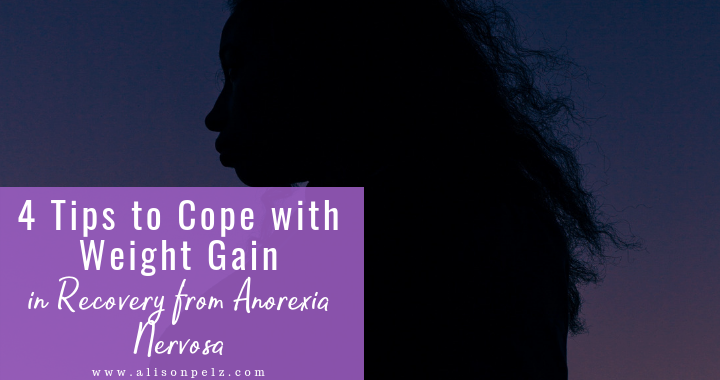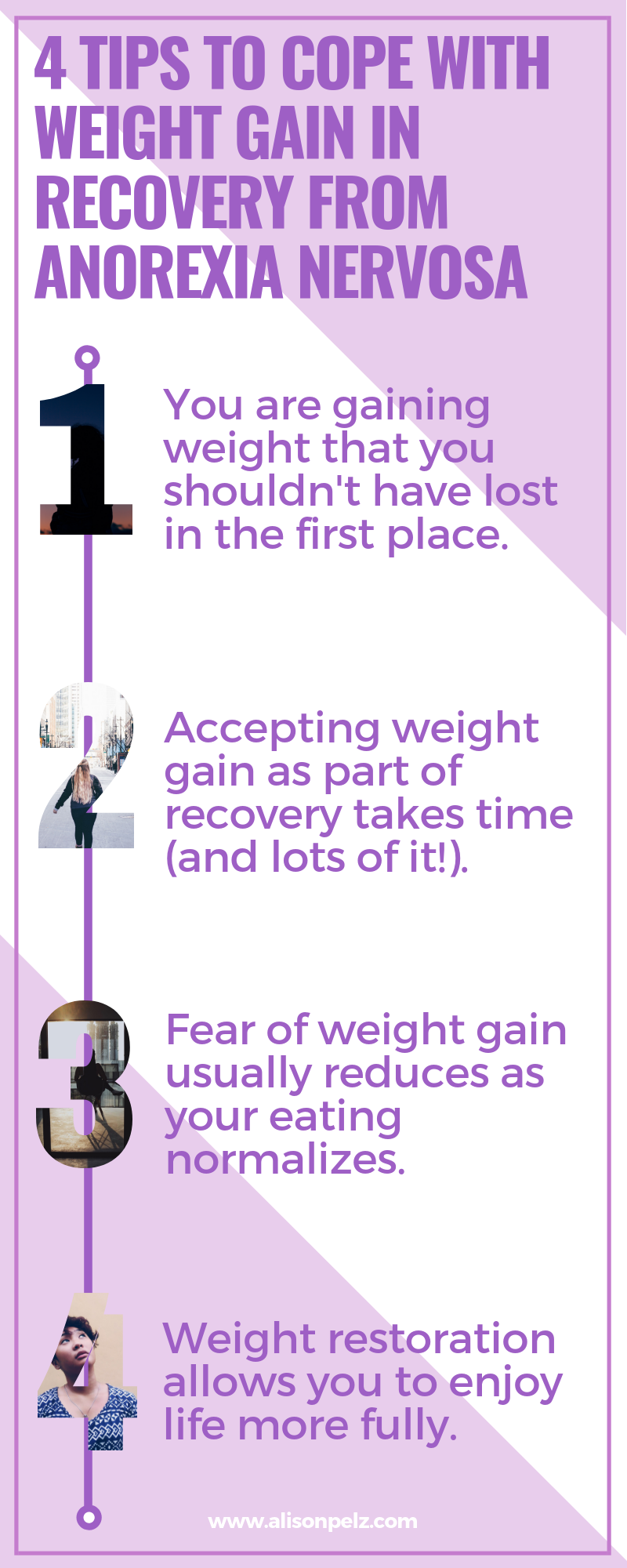Let’s face it – our society gives us strong messages from social media, print media, our schools, and the health care system that weight gain is bad. Wherever we turn we are given the message that weight gain is a death sentence. (Which, by the way, is not true! If you want to learn more on this subject I highly recommend reading Health at Every Size).
Folks who are in recovery from an eating disorder have a double whammy to contend with. One of the key features of anorexia nervosa (or really any eating disorder) is the fear of gaining weight. This fear plus societal pressure to look a certain way can make recovery from an eating disorder feel like an uphill battle.
Therefore, if you are in recovery from an eating disorder, it would make sense that you have an intense fear of gaining weight. However, weight restoration is a must in recovery in order to maintain your physical and mental health.
Helping clients improve body image while restoring weight, nutrition, and health can be the hardest part of the recovery. But it is possible with perseverance, patience, and hope.
I have gathered some wisdom from around the web from other treatment professionals and those in recovery to help you along with the process.
1. You are gaining weight that you shouldn’t have lost in the first place.
The weight gained in eating disorder recovery isn’t just regular weight gain–it’s weight restoration. You are healing through the weight gain – giving back what you shouldn’t have taken from your body in the first place.
Weight restoration can be complicated and difficult, and shouldn’t be a journey you embark on alone. To better understand the process, read this article on what weight restoration is, what it’s comprised of, and what you should expect when going through it. It also includes a discussion of particulars you might not be familiar with, like refeeding syndrome (the complication of increasing food intake too quickly) and hypermetabolism (the increased rate of metabolic activity that often comes along with an eating disorder).
It also covers how difficult the process of weight restoration can be in recovery–and why it is critical to not only have a meal plan for weight restoration but a therapist to help throughout the journey.
Read the whole thing here: Working Through the Weight Restoration Phase of Anorexia Nervosa
2. Accepting weight gain as part of recovery takes time (and lots of it!).
Accepting your body takes time. In fact, it can be one of the slowest parts of recovery. The author of this article provides several useful ways to cope with weight gain, including thanking your body! It is a must read.
Some of the tips covered are:
- remembering our bodies changes are never as visible as we fear
- keeping perspective & remembering that the alternative is worse
Read the whole thing here:
5 Ways To Deal With Weight Gain When You Are In Recovery From An Eating Disorder
3. Fear of weight gain usually reduces as your eating normalizes.
I have seen this in my clinical practice. As clients start to feel better physically because they are feeding themselves more regularly throughout the day, the fear of weight gain can lessen.
As weight gain also naturally redistributes after the initial gain, the prospect of weight gain becomes less overwhelming. Once your body has come out of life-saving mode, the weight you’ve gained back won’t just sit in one place. It will spread across your body, and will not be nearly as visible as someone in recovery might worry about when starting the process.
Yes, Weight Gain Is Hard. Thankfully, We Have 8 Ways to Cope With Weight Gain For You
What this article shows us is that the odds of perpetual weight gain after the initial restoration, are actually pretty low. Your body will adjust back to a stable, healthy weight, and for the most part, stay stabilized.
4. Weight restoration allows you to enjoy life more fully.
“Going to concerts has always been one of my favorite things to do. The atmosphere, the music — I can go on about it for hours. Ever since my eating disorder came to peak, I’d lost this love.”
Dietary restriction and malnutrition often occur pretty slowly, and sufferers from eating disorders may often not notice that their sense of joy and zest for life is blunted and dulled. Without proper nourishment, your body just isn’t able to sustain you through life as well.
With proper nutrition, you will begin to get feel more like your old self. Your body will have the nourishment it needs to keep healthy, to keep energy sustained, and you will be able to once again be an active participant in your life & hobbies.
How I’m Learning to Love Weight Gain in Eating Disorder Recovery
With your renewed energy, your emotions will feel full and vibrant again–allowing you to enjoy life in a way you may have not even realized you were missing out on. With weight gain comes this capacity to feel full and alert and restored.
Accepting weight gain in eating disorder recovery can be a long and difficult journey. It isn’t something that happens overnight. Work and support are necessary components to the journey. Keeping these four key things in mind can help you on your journey to recovery and weight restoration.


